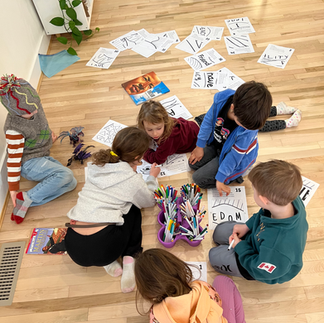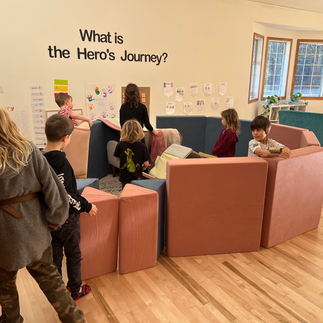This week, continuing our study of heroic people and in honour of Martin Luther King Jr., I asked our young group of heroes, "Can one person change the world, yes or no?". We voted and then went around the circle offering our reasoning. We then read our first book about MLK Jr, an age-appropriate telling of his life from childhood through to his assassination, what life was like at that time, the injustices black people faced, and the great risk he took to stand up for what's right. Afterwards we had a powerful Socratic discussion about this heroic man. I asked the group, "Imagine you are Martin Luther King Jr. You love your partner and your children very much. You want a bright future for them, but know it would be lethally dangerous for you and your supporters to fight for your rights. Would you (a) fight - you can't bear your children suffering the same injustices you have your whole life. or (b) remain quiet and safe, there for your family and hoping things will change on their own."
Putting ourselves in his shoes, considering the magnitude of the decisions he made, turned this discussion into a visceral experience for us all. Their responses were deep and heartfelt. One hero said she would choose to fight. I pushed - "even if that means your children will grow up without you? That they'll feel the pain of losing their parent?" She looked down at her hands and considered for a moment, then said, "Still. If I didn't do anything, nothing would change and I wouldn't want my kids to be treated like I was. And if I did, I could help all those other kids too, not just my own. I would still fight." We were all thoughtful and quiet as we moved forward into our core skills work, and I could see this story and our discussion had touched them deeply.
The next day we read the beautifully illustrated book "I Have a Dream", which centres around MLK Jr's famous speech, emphasizing his vision of equality, peace, and justice for all people. We had yet another powerful discussion about injustices, what we will choose to do when faced with them, and how we can bring about change. After another beautiful Socratic discussion, I left them with this rhetorical question to ponder, this call to action going forward: "We will all come across injustices in our lives, big and small. How we respond can have the power to change the world for the better. How will you respond when you see an injustice?"
This crew continues to set and smash their SMART goals, and are making leaps and bounds in their core skills progress. Giving them the freedom to choose their work, and allowing them to progress at their own pace, has enabled each one to build a solid foundation in their reading, writing, and math. Just like in life, sometimes they get distracted - we let this happen. After each core skills block there is an opportunity for reflection, to see how we did with our goals. If we didn't reach them, we try to identify which monster got in the way of our success (the monster of distraction, resistance, or victimhood), and come up with a plan for how we can defeat this monster next time.
The clear skies brought cold temperatures, and one frosty morning this week our group was greeted with the following quote, written on our lobby chalkboard wall: "Integrity is doing the right thing, even when no one is watching." _C.S. Lewis"
We gathered around the circle rug and I asked them,"Why do some people put their shopping carts away in the grocery store parking lot, while others don't? There's no police officer there handing out tickets to those who don't. No one will shout at you if you don't put it back in its assigned spot. So why do some people choose to do this, while others don't?" I asked them how the quote on our board relates to this scenario? Lots of opinions were shared, and later that day, this group was challenged to examine their own integrity as I stepped out of the studio for the duration of Spark Play. I sat in my office while they played and kept my ears open.
In the two hours they played, unobserved by an adult, I noticed a few breaches of our studio promises (ie: potty talk, which we've agreed is violating our promise to treat the studio as a sacred space, and lots of running!). We gathered on our circle rug and I asked them to rate themselves on their integrity during Spark Play, with 1 being the lowest (broke many promises) and 5 being the highest (played with great integrity, keeping all studio promises). As always, they were very self-aware and I saw ratings varying from 3-4 for the most part. I observed the wheels turning as they realized, acting with integrity is not always easy. I'm so thankful for this model, which allows children to gain lived experience and then reflect, for the deepest, most impactful learning. In this case, learning to be.
In the wise words of Dr. Martin Luther King Jr., "It is always the right time to do the right thing."
























Comentários